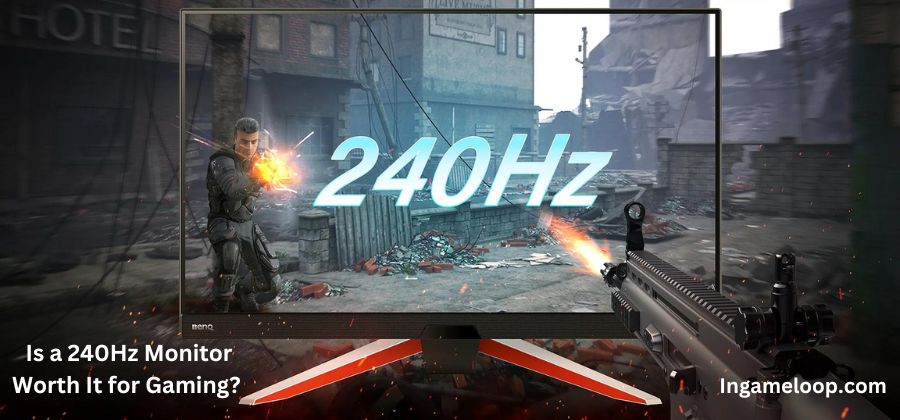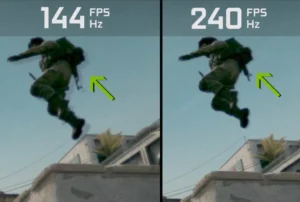
Up until recently, top-tier monitors were thought to have a refresh rate of 60Hz as per the old gaming demands. But a faster refresh rate in gaming displays is now necessary due to the advancement of monitor technology and the need for better monitors for gaming, particularly competitive gaming. One of the greatest technological developments in screens today is the ability to view visuals that are smoother, cleaner, and last longer on monitors with a 240Hz refresh rate. In addition, you won’t see those lagging graphics while playing games or creating content. Rather, the smooth visuals will seek your attention in no time.
Are you Considering switching to a 240Hz gaming monitor from a 144Hz display? Or are you considering upgrading your old 60Hz monitor to a 240Hz one? Either way, this is a debate that may make you quite confused if you are going to buy a new monitor. In contrast, it could be quite normal due to the large variety of monitors you’ll see in the market, but the condition is to read this post until the end. We are here to properly guide you to help you quickly purchase the monitor that’s meant for you and your gaming and graphics needs. Let’s take a quick look and see is a 240Hz monitor worth it for gaming or if we need some other display.
What Does Refresh Rate Mean?
Let’s quickly review the basics for unfamiliar people before we start. What does a refresh rate signify, and what is it defined as? In essence, the number of frames a monitor can display each second depends on its refresh rate, which is expressed in Hertz. In other words, the maximum frames-per-second that the monitor can communicate in real-time closely correlates with the refresh rate. This is the most crucial feature of a monitor that you’ll have to consider before purchasing a new one.
The typical display has a refresh rate of 60 Hz, as you are aware, while most gaming monitors currently have 144 Hz refresh rates. However, as was already said, several models have 240Hz refresh rates, and a few recent monitors can even reach 360Hz. In general, the higher the refresh rate, the smoother experience you would be able to experience and vice versa. But the refresh rate or graphics resolution also depends upon your usage. We’ll now examine the particular benefits and drawbacks of monitors with such high refresh rates.
Is a 240Hz Monitor Worth It for Gaming?

The short answer is yes, the 240Hz monitor is worth it. But several other factors are also there that you must consider. No doubt, higher frame rates offer a more smooth and more responsive gaming experience, but there are still a few things to consider. First and foremost, it becomes increasingly difficult for the human eye to detect any change as frame rates increase. While it is simple to distinguish between 30 and 60 frames per second and between 60 and 144 frames per second, it gets exceedingly challenging to do so between 144 and 240 frames per second.
Even though there is a significant performance improvement, many people find it difficult to detect the difference between a 144Hz and a 240Hz panel. The vast majority of 240Hz displays are still 1080p. So, purchasing one would probably mean that you would be sacrificing graphics for performance. In addition, there is the issue of resolution. Naturally, some gamers are happy with this and would prefer more frames to more pixels any day of the week, but others wouldn’t think the performance boost was worth the improved visual fidelity that 1440p or 4K offered.
What are the pros and cons of a 240Hz display?
Several benefits of 240Hz monitors may impact your selection and decision. You must consider all these pros and cons of 240Hz panels before choosing one.
REASONS TO BUY
✓A more fluid gaming experience with improved responsiveness and less motion blur.
✓The possibility for marginally quicker reaction speeds in multiplayer competition due to lower latency times.
✓A high refresh rate panel comes with better dynamic range, anti-eye-strain technologies, and more.
REASONS TO AVOID
✗Most of the 240Hz monitors are based on TN, IPS, and VA panels; you may face subpar color production.
✗The current-era 240Hz monitors with HD+ resolution are expensive.
Does graphics card affect refresh rate?
If we are talking about refresh rates and high-quality displays, it is integral that we understand the role of a graphic card. Fundamentally, your graphics card renders the output from the CPU and displays it on your screen. Now, if you are going for a 240Hz display, you will have to have a top-notch GPU to support it. Otherwise, it won’t help much, as the frames per second (FPS) required for a smooth experience will not be achieved. So, it is advised to consider your graphics card first and choose the monitor accordingly.
However, while there are high-quality 240Hz displays available, they are also more expensive. Consequently, depending on your objectives, a 144Hz 1440p or even a 60Hz 4k display may better fit your usage. Finally, keep in mind that such high frame rates require a graphics card with sufficient power. The graphics card must be capable enough to handle the demanding AAA games without any lag. Therefore, considering only the high-refresh-rate graphics performance isn’t the whole story. You must prefer the other quality measure as well.
Conclusion
Finally, with the foregoing in mind, we return to the initial query: is a 240Hz display worth gaming? Firstly, You must respond to the fundamental inquiry: do you value performance more than visuals? There is no such thing as a flawless monitor, and developing one would come with a heavy price tag as well. A 240Hz display may be worthwhile if you prefer the fluidity of high refresh rates to the clarity offered by higher resolutions. Plus, if your GPU can handle these high refresh rates in the majority of the games you play.
For the majority of individuals, we’d suggest a 144Hz display would be more appropriate. In particular, if you have a limited budget, it would be more reasonable, and a 144Hz 1440p monitor would be a perfect compromise that would have you covered in terms of both performance and graphics. Of course, each gamer must decide this for themselves, and it would be ideal if you could actually use a 240Hz panel. We hope this article helped you answer your query and summarized the whole scenario.
Frequently Asked Questions
Is it worth getting a 240Hz monitor?
A 240Hz monitor is definitely worth getting for playing games up to a competitive edge at a top-tier three-digit refresh rate. Moreover, the 240Hz monitors give a hardcore in-game responsiveness, another positive aspect of gaming.
Is 240Hz monitor overkill?
A 240Hz monitor could be overkill if you aren’t using its true potential or pairing a low-tier graphics card to play games. In such a case, there would not be a 240Hz refresh rate on the screen due to incompatible hardware. In contrast, if you’re playing games at a 240Hz refresh rate, a 240Hz monitor is worth buying.
Does 144Hz and 240Hz make a difference?
Yes, there is a huge difference in terms of higher refresh rate, improved graphics smoothness, and lower latencies with the 240Hz monitor. But remember, the overall visual difference between 144Hz and 240Hz isn’t as much as it’s in the case of 60Hz and 144Hz monitors.




![How To Apply Thermal Paste? [2024]](https://www.ingameloop.com/wp-content/uploads/How-to-Apply-Thermal-Paste-450x257.jpg)
![Is Nvidia G Sync Worth It? [2024]](https://www.ingameloop.com/wp-content/uploads/Is-Nvidia-G-Sync-Worth-it-450x257.jpg)

![What is Overdrive on a Monitor? [2024]](https://www.ingameloop.com/wp-content/uploads/What-is-overdrive-on-monitor-450x257.jpg)